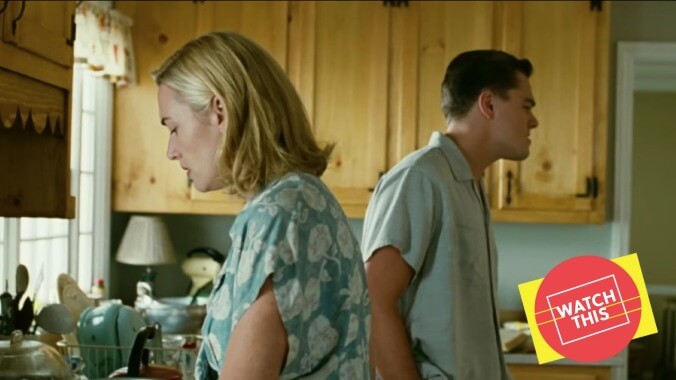A decade after Titanic, Kate and Leo went toe-to-toe in the hell of midcentury suburbia

Watch This offers movie recommendations inspired by new releases, premieres, current events, or occasionally just our own inscrutable whims. This week: With Man Of Steel costars Kevin Costner and Diane Lane appearing together again in Let Him Go, we’re looking back at other onscreen star reunions.
Revolutionary Road (2008)
Jack dies at the end of Titanic because fate is cruel, but also—in a more immediate, narrative sense—because he has to. If he didn’t sink into the icy depths of the Atlantic at the end of the movie, he and Rose would have made it to America, and presumably started a life together in New York. In between nude modeling sessions, someone would have to cook and do the dishes. They’d have to get jobs. Fights, kids, and a probable move to the suburbs would lay in their future. An unromantic reality would encroach on a love too pure to survive in our unkind world, forever frozen in its honeymoon period. In other words, the happily-ever-after version of their story would have to reconcile with the conflict and arduousness inherent to any long-term relationship. Jack and Rose seemed to have a good thing going, so who knows, maybe those crazy kids would’ve made it work. But in the worst-case scenario, their union would have curdled into something along the lines of Revolutionary Road.
With his adaptation of Richard Yates’ 1962 novel, Sam Mendes reunited the most dreamy onscreen couple of the ’90s for the first time since they went down with the ship over a decade earlier. And he put their nitroglycerine chemistry to good use: Kate Winslet and Leonardo DiCaprio both turn their star personas inside out as Frank and April Wheeler, a couple with enmities to match the intensity of their passions. When they first meet, she’s an aspiring actress and he isn’t much of anything; soon, she gets knocked up and he lands a salesman job in an office that might as well be downstairs from Sterling Cooper. Like Don Draper, he takes to boozing and the occasional philander to cover his existential lack of fulfillment, and like Betty, she chafes under the constrictive role of a housewife. To throw off the oppressive yoke of commuter-country Connecticut, they make plans to move to Paris and start anew, but events and their own insecurities conspire against them. Once Frank learns that his spouse will be the primary breadwinner in a country where she speaks the language and he doesn’t, his masculinity is threatened and the social mores of the ’50s collide with the free-spirited ’60s.

 Keep scrolling for more great stories from The A.V. Club.
Keep scrolling for more great stories from The A.V. Club.